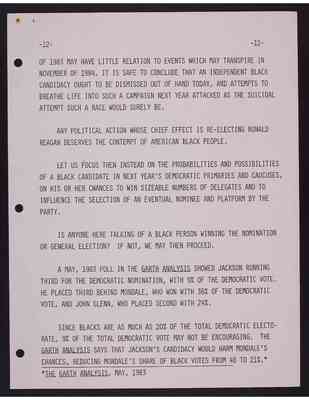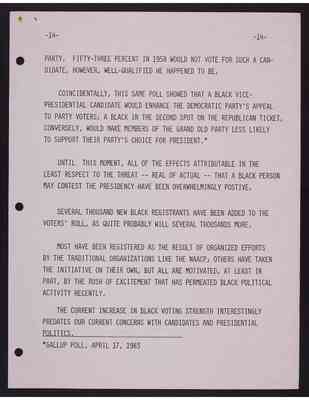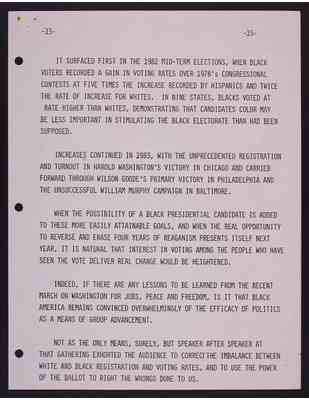Pages
11
-11-
It is important to note that Jackson has disavowed an independent candidacy, much as John Anderson did. He then ended his race for the Republican nomination and faced Jimmy Carter and Ronald Reagan as an Independent in November, 1980.
Crusades are difficult to contain; constant celebrity almost impossible to abandon voluntarily.
The Gallup figures show than an independent Jackson candidacy in the November, 1984 general election would reduce Reagan's expected share of black votes from 10% of the total cast to 7%.
Walter Mondale's expected 80% share of black votes would be reduced to only 29%, causing his defeat, and the Rev. Jackson would end in third place with 48% of black votes cast.
Gallup's projections are that 41% of all voters would choose Reagan, giving him another four year lease on the presidency and another four-year noose around black people's neck; Mondale would finish a close second, a position important only in horseshoes, with 40% of the total vote, and Rev. Jackson would come in at last place with 9% of all votes cast.*
In this second scenario, Jackson's gains are Mondale's looses, and while we may properly acknowledge that polls taken in early June
*Gallup poll, June 5, 1983
12
-12-
of 1983 may have little relation to events which may transpire in November of 1984, it is safe to conclude that an independent black candidacy ought to be dismissed out of hand today, and attempts to breathe life into such a campaign next year attacked as the suicidal attempt such a race would surely be.
Any political action whose chief effect is re-electing Ronald Reagan deserves the contempt of American black people.
Let us focus then instead on the probabilities and possibilities of a black candidate in next year's Democratic primaries and caucuses, on his or her chances to win sizeable numbers of delegates and to influence the selection of an eventual nominee and platform by the party.
Is anyone here talking of a black person winning the nomination or general election? If not, we may proceed.
A May, 1983 poll in the Garth analysis showed Jackson running third for the Democratic nation, with 9% of the Democratic vote. He placed third behind Mondale, who won with 36% of the Democratic vote, and John Glenn, who placed second with 24%.
Since blacks are as much as 20% of the total Democratic electorare, 9% of the total Democratic vote may not be encouraging. The Garth analysis says that Jackson's candidacy would harm Mondale's chances, reducing Mondale's share of black votes from 48 to 21%,*
*The Garth analysis, May, 1983
13
-13-
The most recent poll taken before this meeting that I could discover - released in the August 29 issue of Newsweek magazine - confirmed the effects of a campaign by Rev. Jackson.
Newsweek says a Jackson campaign would reduce Reuben Askew's black vote by one percentage point, from 3 to 2%; Alan Cranston's shae of black votes would be cut in half, from 4 to 2%; John Glenn's black vote would be cut from 15 to 9%; Gary Hart's one percent share of black votes would be totally erased, and Walter Mondale's commanding 47% of black votes would be reduced to 29%, the same figure as in the June Gallup poll I cited earlier.
Only Ernest Hollins -- to whom Newsweek gives a modest 2% of black votes -- would be unaffected by Jesse Jackson entering the Democratic primary race.*
One final poll result. The Gallup poll and the National Opinion Research Center of Chicago have found that the numbers of Americans who say in 1983 they will consider voting for a black candidate for President are higher now than ever before.
Seventy-seven percent in the Gallup survey and 85% in the Chicago-based poll said a black candidate would get their consideration, if not necessarily their vote.
That is a great increase, nonetheless, over previous years. As recently as 1958, only 38% of Gallup's respondents would admit they would vote for a black presidential candidate nominated by their
*Newsweek magazine, August 29, 2983, PP. 15
14
-14-
party. Fifty-three percent in 1958 would not vote for such a candidate, however, well-qualified he happened to be.
Coincidentally, this same poll showed that a black Vice-Presidential candidate would enhance the Democratic Party's appeal to party voters; a black in the second spot on the Republican ticket, conversely, would make members of the Grand Old Party less likely to support their party's choice for President.*
Until this moment, all of the effects attributable in the least respect to the threat -- real of actual -- that a black person may contest the Presidency have been overwhelmingly positive.
Several thousand new black registrants have been added to the voters' roll, as quite probably will several thousands more.
Most have been registered as the result of organized efforts by the traditional organizations like the NAACP; others have taken the initiative on their own, but all are motivated, at least in part, by the rush of excitement that has permeated black political activity recently.
The current increase in black voting strength interestingly predates our current concerns with candidates and Presidential politics.
*Gallup poll, April 17, 1983
15
-15-
It surfaced first in the 1982 mid-term elections, when black voters recorded a gain in voting rates over 1978's Congressional contests at five times the increase recorded by Hispanics and twice the rate of increase for whites. In nine states, blacks voted at rate higher than whites, demonstrating that the candidates color may be less important in stimulating the black electorate than had been supposed.
Increases continued in 1983, with the unprecedented registration and turnout in Harold Washington's victory in Chicago and carried forward through Wilson Goode's primary victory in Philadelphia and the unsuccessful William Murphy campaign in Baltimore.
When the possibility of a black Presidential candidate is added to these more easily attainable goals, and when the real opportunity to reverse and erase four years of Reaganism presents itself next year, it is natural that interest in voting among the people who have seen the vote deliver real change would be heightened.
Indeed, if there are any lessons to be learned from the recent march on Washington for jobs, peace and freedom, is it that black America remains convinced overwhelmingly of the efficacy of politics as a mean of group advancement.
Not as the only means, surely, but speaker after speaker at that gathering exhorted the audience to correct the imbalance between white and black registration and voting rates, and to use the power of the ballot to right the wrongs done to us.




